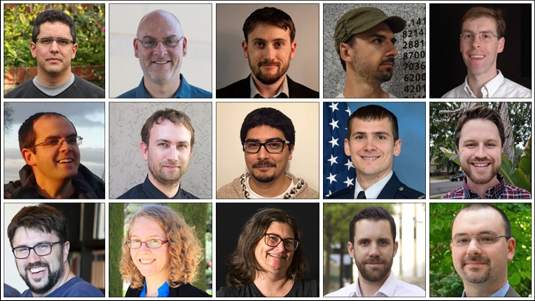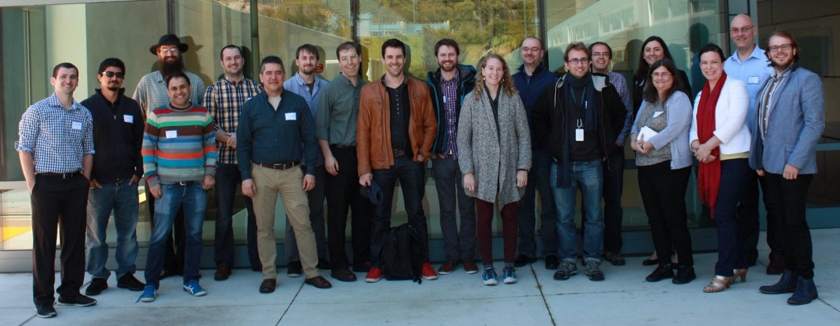| Jupyter Receives ACM Award |
| Written by Sue Gee | |||
| Thursday, 03 May 2018 | |||
|
The Project Jupyter team has been awarded the Association of Computing Machinery (ACM) Software System Award for developing a tool that has had a lasting influence on computing. It is the largest team ever to receive this award.
The Association for Computer Machinery is the world's foremost professional membership organization for computing. Among its annual awards the Turing Award is the best known and most lucrative with a prize of $1 million the most lucrative. The System Software Award carries a prize of $35,000, funded by IBM. It is one of four technical awards in which recipients are selected by their peers for making significant contributions that enable the computing field to solve real-world challenges. Officially, the recipients of the award are the fifteen members of the Jupyter steering council as of November 2016, the date of nomination (listed in chronological order of joining the project): Fernando Pérez, Brian Granger, Min Ragan-Kelley, Paul Ivanov, Thomas Kluyver, Jason Grout, Matthias Bussonnier, Damián Avila, Steven Silvester, Jonathan Frederic, Kyle Kelley, Jessica Hamrick, Carol Willing, Sylvain Corlay and Peter Parente.
Acknowledging the award. the Jupyter blog notes: This is the largest team ever to receive this award, and we are delighted that the ACM was willing to recognize that modern collaborative projects are created by large teams, and should be rewarded as such. Still, we emphasize that Jupyter is made possible by many more people than these fifteen recipients. This award honors the large group of contributors and users that has made IPython and Jupyter what they are today. The recipients are stewards of this common good, and it is our responsibility to help this broader community continue to thrive.
Some of Jupyter contributors and users that made Jupyter possible — Biannual development meeting, 2016 A public release from the DOE/Lawrence Berkeley National Laboratory, where Fernando Pérez who pioneered the software provides this background to the award: Project Jupyter, which evolved from iPython, is an open, international collaboration that develops tools for interactive computing: a process of human computer interplay for scientific exploration and data analysis. The collaboration develops applications such as the widely popular Jupyter Notebook, an open-source web app that allows users to create and share documents that contain live code, equations, visualizations and narrative text. Today, more than 2 million Jupyter Notebooks are hosted on the popular GitHub service, covering technical documentation to course materials, books and academic publication. Jupyter has been transformative in scientific collaborations and reproducibility. It goes on to point the widespread use of Jupyter in education and industry. Jupyter Notebooks are used In high schools and universities.to teach subjects subjects including Computer Science, Aerodynamics, Numerical Methods, Statistics, Computational Physics, Cognitive Science and Data Science. Major companies have created hosted services based on Jupyter - Google's Cloud DataLab, Microsoft's Notebooks on Azure and IBM's Data Science Experience all offer Jupyter Notebooks on their respective cloud infrastructure. Damián Avila, a member of the Jupyter Steering Council and therefore one of the recipients of the ACM award outlines reasons why Project Jupyter is receiving it: 1) Jupyter is explicitly designed for the task of computing interactively 2) Jupyter fosters communication and collaboration through open standardized formats But the most important thing ... is the Jupyter community. IPython and Jupyter have grown to be the product of thousands of contributors and users. We are always seeking to ensure the project is welcoming, supports an increasingly diverse community, and helps solidify a foundation for it to be sustainable. The award will be presented to the team at the ACM Awards banquet in San Francisco on June 23, 2018.
More Information2017 ACM Software System Award
Related ArticlesRISC Pioneers Gain Turing Award Tim Berners-Lee Awarded Turing Prize Turing Award Now Million Dollar Prize Diffie and Hellman Receive Turing Award Why Programmers Don't Join The ACM
To be informed about new articles on I Programmer, sign up for our weekly newsletter, subscribe to the RSS feed and follow us on Twitter, Facebook, Google+ or Linkedin.
Comments
or email your comment to: comments@i-programmer.info
|
|||
| Last Updated ( Thursday, 03 May 2018 ) |





